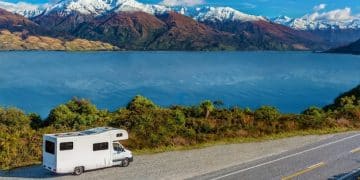How to Start a Location-Independent Business as a Digital Nomad in the US

Starting a location-independent business as a digital nomad in the US involves defining your niche, establishing a legal entity, managing finances, marketing effectively, and ensuring compliance with regulations, all while leveraging the freedom of remote work to travel and live anywhere.
Dreaming of ditching the 9-to-5 and exploring the world while earning a living? Starting a location-independent business as a digital nomad in the US can turn that dream into reality. It’s all about creating a business that isn’t tied to a physical location, allowing you the flexibility to work from anywhere with an internet connection.
Choosing the Right Location-Independent Business Idea
The first step in creating a location-independent business is identifying a viable business idea. This involves considering your skills, passions, and market demand. The best location-independent businesses are those that can be conducted entirely online.
Identifying Your Skills and Passions
Think about what you’re good at and what you enjoy doing. What are your hobbies? What skills have you developed in previous jobs? Combining your skills and passions will make your business more sustainable and enjoyable.
Evaluating Market Demand
Just because you’re passionate about something doesn’t mean there’s a market for it. Research potential business ideas to determine if there’s a demand for your services or products. Use tools like Google Trends, market research reports, and social media analytics to gauge interest. Are people searching for solutions you can provide?
- Freelance Writing or Editing: Offer your writing or editing skills to businesses and individuals. There’s a constant demand for quality content.
- Virtual Assistant Services: Provide administrative, technical, or creative assistance to clients remotely.
- E-commerce: Sell products online through platforms like Etsy, Shopify, or Amazon.
- Online Coaching or Consulting: Share your expertise with others through online coaching or consulting services.
Choosing the right business idea sets the stage for success. Ensure it aligns with both your capabilities and the needs of the market. This will make it easier to build and scale your location-independent business in the long run.

Setting Up Your Business Legally
Once you have a business idea, you need to establish your business legally. This involves choosing a business structure and registering your business. It’s crucial to comply with all legal requirements to avoid potential issues down the road.
Choosing a Business Structure
Select a business structure that suits your needs. Common options include sole proprietorship, limited liability company (LLC), and S corporation. Each structure has different implications for liability, taxes, and administrative requirements.
Registering Your Business
Register your business with the appropriate state and federal agencies. This may involve obtaining an Employer Identification Number (EIN) from the IRS and registering your business name. Compliance with these requirements is essential for legitimacy.
Opening a Business Bank Account
Keep your personal and business finances separate by opening a business bank account. This simplifies bookkeeping and provides a professional image for your business.
- Sole Proprietorship: Simple to set up, but offers no personal liability protection.
- LLC: Provides personal liability protection and is relatively easy to set up.
- S Corporation: Offers potential tax advantages for some business owners.
Establishing your business legally provides a solid foundation for your operations. Ensure you understand and comply with all applicable regulations to avoid legal complications as you grow.
Managing Finances as a Digital Nomad
Effective financial management is crucial for the long-term success of your location-independent business. This involves setting up systems for tracking income and expenses, budgeting, and paying taxes. Staying on top of your finances will ensure you remain profitable and compliant.
Tracking Income and Expenses
Use accounting software like QuickBooks or Xero to track your income and expenses. This will help you monitor your financial performance and prepare for tax season. Accurate record-keeping is essential for informed decision-making.
Budgeting for Business and Travel
Create a budget that includes both your business and travel expenses. This will help you manage your cash flow and avoid overspending. Allocate funds for marketing, software, accommodation, and transportation.
Paying Taxes as a Digital Nomad
Understand your tax obligations as a digital nomad. You may need to pay federal, state, and local taxes, depending on your business structure and income. Consult with a tax professional to ensure compliance.
Managing your finances effectively as a digital nomad requires discipline and organization. By setting up the right systems and seeking professional advice, you can ensure your financial stability and success.

Marketing Your Location-Independent Business
To succeed as a digital nomad entrepreneur, invest time and effort in marketing your business. Without customers, your business won’t be able to take off. Determine effective distribution channels such as social media, search engine optimization, and email.
Social Media Marketing
Building a social following on appropriate social medial channels (Instagram, Facebook, X and LinkedIn) makes it possible to engage with potential customers. Share valuable content, engage in conversations, and run targeted ads to make potential customers more comfortable booking with you.
Search Engine Optimization (SEO)
SEO optimizes online content to rank higher in search engines, increasing visibility to those searching for your products or services. Focus on keyword research, on-page optimization, and link building to drive organic traffic to your website.
Email Marketing
With email marketing, you can get in direct contact with potential customers who may be interested in your product. Collect email addresses, send out newsletters, and craft personalized promotional messages.
Marketing your business consistently and strategically makes it possible to attract and retain customers or clients. Try out a variety of platforms to assess which strategies make the most sense for your business.
Essential Tools and Resources for Digital Nomads
A digital nomad relies on a number of essential tools and resources to effectively operate their business. These may range from project management software to cloud storage.
Communication and Collaboration Tools
Tools like Slack, Zoom, and Google Workspace facilitate communication and collaboration with clients and team members. Stay connected and productive, regardless of your location.
Project Management Software
Consider using a project management tool, like Asana or Trello, for organizing your work. With these services, easily set up tasks, set deadlines, and manage projects.
Cloud Storage
Storing your files in the cloud, with services like Google Drive or Dropbox, ensures that you can access them wherever you go. Cloud services also offer security.
- VPN: A Virtual Private Network (VPN) encrypts your internet connection, securing your data when using public Wi-Fi.
- Password Manager: A password manager helps you create and store strong passwords, protecting your online accounts from cyber threats.
- Travel Insurance: Travel insurance provides coverage for medical emergencies, trip cancellations, and lost luggage.
Leveraging these essential tools helps you manage your business efficiently and securely while on the road. Invest in the right technology and resources to support your digital nomad lifestyle.
Maintaining Work-Life Balance as a Digital Nomad
While living as a digital nomad is exciting, it comes with some challenges managing work-life balance. It’s important to take steps to manage your schedule, stay connected with friends and family, and prioritize self-care.
Setting Boundaries
Establish clear boundaries between work and personal life. Set specific work hours and stick to them as much as possible. This helps prevent burnout and ensures you have time for other activities.
Staying Connected
Maintain relationships with friends and family by scheduling regular calls and video chats. Staying connected with loved ones can combat feelings of isolation and loneliness.
Prioritizing Self-Care
Take care of your physical and mental health by exercising regularly, eating a healthy diet, and getting enough sleep. Practicing mindfulness and meditation can help reduce stress and improve your overall well-being.
Maintaining a healthy work-life balance as a digital nomad is essential for your long-term happiness and success. By setting boundaries, staying connected, and prioritizing self-care, you can enjoy the freedom of location independence without sacrificing your well-being.
| Key Point | Brief Description |
|---|---|
| 💡 Business Idea | Choose a business that aligns with your skills and market demand. |
| ⚖️ Legal Setup | Establish your business legally to avoid future complications. |
| 💰 Financial Management | Track income and expenses, and budget for business and travel. |
| 🌐 Marketing Strategy | Use social media, SEO, and email marketing to reach your target audience. |
FAQ
▼
A location-independent business is one that isn’t tied to a physical location. You can operate it from anywhere with an internet connection, making it ideal for digital nomads.
▼
Common options include freelance writing, virtual assistant services, e-commerce, online coaching, and consulting. These businesses can be managed entirely online from any location.
▼
Use accounting software to track income and expenses. It’s helpful to set up a budget that includes both business and travel costs. Also consult with tax professionals.
▼
Communication tools (Slack, Zoom), project management software (Asana, Trello), cloud storage (Google Drive, Dropbox), and security tools (VPNs, password managers) are all essential.
▼
Set clear boundaries between work and personal time. Stay connected with friends and family. Also, prioritize self-care through regular exercise, a healthy diet, and mindfulness practices.
Conclusion
Starting a location-independent business as a digital nomad in the US requires careful planning and execution. By choosing the right business idea, setting up legally, managing your finances, marketing effectively, and utilizing essential tools, you can create a successful and fulfilling location-independent lifestyle.





